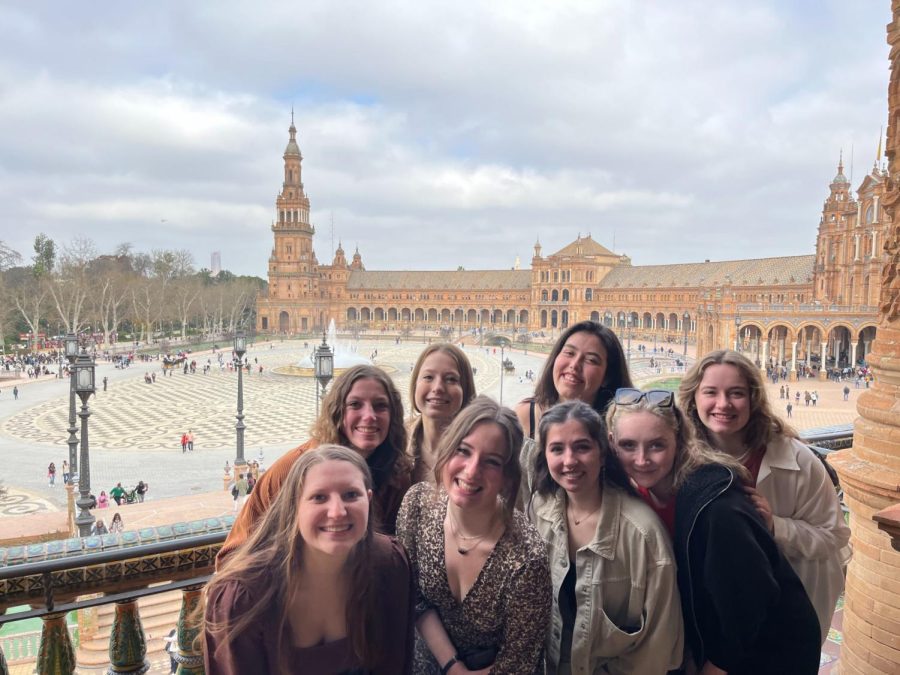Across the Pond
Women in Spain: an appreciation post
Photo by Grace Schutte
On the scale of Midwest-Nice to Hey-I’m-Walkin’-Here!, the women in Spain are fashion-forward Bostonians.
Note: “Across the Pond” is an on-going column in which freelance writer Grace Schutte will be writing about her study abroad experience in Valladolid, Spain.
The women in Spain are Girlbosses, with a capital “g.”
I know I cross the line of editorializing with this statement — a journalism taboo and express no-no — and that my fellow journalists are regarding me with wary eyes as a result; but, it is the truth, and there is historical evidence to back up my claim.
When it came to the history of Spain, I knew very little about it before moving here. The mental image I had of the country consisted of siestas, bulls and colonization, if I’m being honest (which I am).
But once I started taking classes at the local university, I was introduced to the political history of the country, which is relevant to today’s article.
In the years leading up to World War II, Spain underwent a civil war, resulting in Fransisco Franco assuming power over the country.
As an ultra-conservative fascist (this, dear reader, is not editorializing), Franco believed in authoritarianism, nationalism, national Catholicism and militarism, according to the website ER Services.
Franco’s death in the early 1970s marked the end of the dictatorship as well as the beginning of the nation’s transition to democracy. Despite the moves toward political freedom, Spain was 30 years behind the rest of the European Union in many ways — one of them being gender equality.
The expectations for women were of the typical sort: take care of the home and everyone in it, but only in a way that ensures your inferiority to men.
However, it is important to note, this was a time of civil unrest — these women had lived through a civil war and were no strangers to struggle and strife. Political and social oppression hardened their personalities and toughened their skins: this evolution was necessary for survival.
But that was then. Today, nearly 50 years after the dictatorship, these characteristics remain.
On the scale of Midwest-Nice to Hey-I’m-Walkin’-Here!, the women in Spain are fashion-forward Bostonians: stoic on the outside with an air of cool indifference toward the world.
They are the epitome of the slicked-back, high ponytail; the embodiment of Miss Mysterious, a gemini through and through; like a shot of espresso — and it’s wonderful.
Even when doing something as mundane as walking down the street, there is a certain urgency in their steps, a determination to get to where they’re going because they have things to do and people to see.
Girlbosses, all of them.
But that’s just the exterior. While they appear to be incredibly intimidating, the women I’ve had the privilege of meeting are fun, easy-going and generous in their compliment-giving.
When they realize I’m not from these parts, the ladies like to come up and introduce themselves, striking up the “Where are you from?” conversation with great interest.
It’s happened just about everywhere, too: in line to check out at the store, when sitting down for coffee in a cafe, or when exiting the bathroom in a Discoteca.
Even if the interaction lasts a few minutes, Instagram handles are sure to be exchanged and plans made to meet up sometime soon.
When they’re with their friends, they’re loud and walk shoulder-to-shoulder — sometimes taking up the whole sidewalk, and — get a load of this — they don’t move for anyone. My Midwestern spirit trembles at the thought.
I refuse to credit their cool composure to any man, but for the sake of the argument, I think the societal changes Spain went through in the past 60 to 70 years had an effect.
Regardless, the women in Spain are Girlbosses, with a capital “g.”
Schutte can be reached at schuttge3524@uwec.edu.

Grace Schutte is a fourth-year creative writing and Spanish student. This is her fifth semester on staff, having previously served as a staff writer, Chief Copy Editor, a freelance writer, Currents Editor, and now as the OP/ED Editor. She is currently daydreaming about living softly. She is very content.

